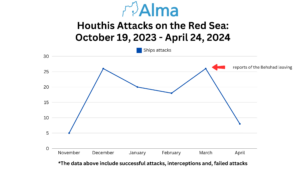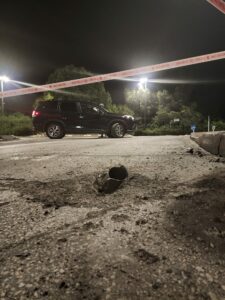Iranian Foreign Minister Hossein Amir-Abdollahian arrived in Lebanon for an official visit on Wednesday, April 26, 2023. After visiting Oman, he visited Lebanon for three days, continuing from there to official meetings in Syria. His visit to Lebanon began in Beirut, where he met with several senior officials. The discussions revolved around the latest developments in Lebanon and the region.
Iranian Foreign Minister Hossein Amir-Abdollahian arrived in Lebanon for an official visit on Wednesday, April 26, 2023. After visiting Oman, he visited Lebanon for three days, continuing from there to official meetings in Syria. His visit to Lebanon began in Beirut, where he met with several senior officials. The discussions revolved around the latest developments in Lebanon and the region. Upon his arrival in Lebanon, he told the media that he had come as Iran’s representative to declare Iran’s full support for Lebanon, the people, the army, and the resistance. He also said he had devised several ideas to improve Lebanon’s situation. He added that new events are taking place in the region and that the Islamic Republic always calls for negotiations and does not consider war a solution.
The Iranian minister only forgot to mention that Iran and its proxies are behind most of the terrorist acts taking place in the Middle East, actions that could easily lead to war. This is in addition to the fact that Iran constantly calls for Israel’s destruction (apparently, the Iranian minister means that Iran and its proxy want to destroy Israel through negotiations…).
This is the first visit to Lebanon by a senior Iranian official after signing the agreement between Iran and Saudi Arabia last month (March). The two sides hope that the improvement in relations will benefit Lebanon and solve the problem of electing a president.
The Iranian Foreign Minister Abdollahian conducted discussions with several senior officials, including Gebran Bassil, chairman of the Free Faction party, Amal movement chairman Nabih Berri, Prime Minister Najib Mikati, Foreign Minister Abdallah Bou Habib, and others.
All the meetings were held behind closed doors, and all the information reported is based on media assessments and possibly leaks.
The main points discussed:
- Iran still adheres to the “people, army, resistance” equation and will continue to support Hezbollah, arm Hezbollah, and finance it.
- The Iranian minister made it clear that he does not hold meetings only with Shi’ite leaders and is open to meetings with all political parties. The Lebanese government is friendly with all factions of the Lebanese people.
- The Saudi-Iranian agreement is a turning point in the region; Iran is fulfilling all the promises it made to them.
- Iran will not interfere in the presidential affairs or Hezbollah’s considerations if France decides that Suleiman Frangieh is the most suitable person for the presidency.
- Iran will help extricate Lebanon from its complex, difficult situation and support it economically in its infrastructure, fuel, construction, and especially electricity shortage.

The Iranian Minister’s meeting with Nasrallah:
Nasrallah presented the Iranian minister with the developments regarding the presidential subject, explaining that it was a Lebanese issue and that external factors should not be involved in decision-making. Nasrallah added that there must be cooperation and respectful dialogue between all parties. The minister reinforced Nasrallah’s remarks and said that his government supported Hezbollah in every decision the organization made. The Iranian minister noted that Iran will always support the organization, the resistance groups, and Palestinian factions in Lebanon and Gaza.

The Iranian minister meeting with PIJ Secretary General Ziad al-Nakhalah:
- The two discussed recent developments in the region, the West Bank, and the Gaza Strip, especially Israel’s aggression against the Palestinian people and Islamic institutions.
- The Iranian minister expressed his support for the Palestinian people and stressed the importance of continuing the struggle.
The Iranian minister’s visit to southern Lebanon:
On Friday, April 28, the Iranian foreign minister toured the border between Israel and Lebanon. Of course, the entire tour in the south was Hezbollah’s responsibility and was closely accompanied by its operatives. The Iranian minister arrived at the permanent observation point in the “Iran Garden” at Maroun al-Ras and observed the Promised Land…
During the tour, the Iranian minister spoke with Lebanese soldiers on the border, received a security review from the officers, and finally planted a tree with a consecration in the village of Maroun al-Ras. At the end of the tour, the Iranian minister received, as a souvenir gift from Hezbollah, a piece of an Israeli Yas’our helicopter shot down by Hezbollah during the Second Lebanon War (2006).

Of course, the visit had a very high media profile, and some commentators claimed that it was a response to the visit of Israeli Foreign Minister Eli Cohen two weeks ago to Turkmenistan near the border with Iran.
Carefully speaking, we are not sure that this visit by the Iranian minister to southern Lebanon was unusual. It is common for Hezbollah, the de facto host of the Iranian minister in Lebanon, to bring most of the senior Shiite Axis figures visiting Lebanon to the Maroun al-Ras observation post. Therefore, the Iranian minister’s visit and presence at the site are not unique. It is possible that the timing (so it turned out…) created the unusual “fuss”: the arrival after the rocket attacks on Passover, the security tensions, and the visit of the Israeli foreign minister to the Caucasus.







